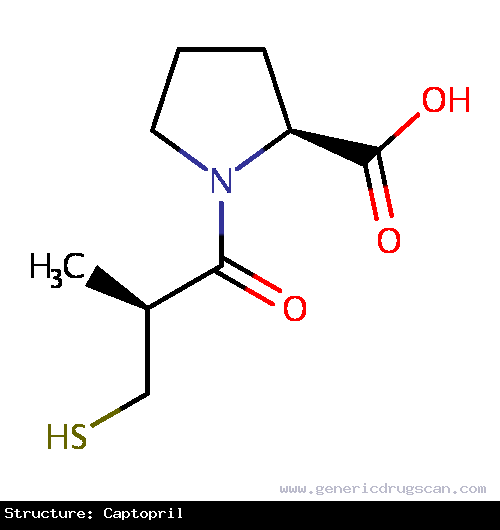Captopril Drug: Indication, Dosage, Precaution, Side Effect , Storage, Category Type and corresponding Brands - www.genericdrugscan.com
Captopril
Drug Status in USA : ApprovedDrug Status in Canada : Approved
pronunciation
pronounced as (kap' toe pril)
Why is this medication prescribed?
Captopril is used alone or in combination with other medications to treat high blood pressure and heart failure. It is also used to improve survival and reduce the risk of heart failure after a heart attack in patients a heart condition called left ventricular hypertrophy (enlargement of the walls of the left side of the heart). Captopril is also used to treat kidney disease (nephropathy) caused by diabetes in patients with type 1 diabetes and retinopathy (eye disease). Captopril is in a class of medications called angiotensin-converting enzyme (ACE) inhibitors. It decreases certain chemicals that tighten the blood vessels, so blood flows more smoothly and the heart can pump blood more efficiently.
High blood pressure is a common condition, and when not treated it can cause damage to the brain, heart, blood vessels, kidneys, and other parts of the body. Damage to these organs may cause heart disease, a heart attack, heart failure, stroke, kidney failure, loss of vision, and other problems. In addition to taking medication, making lifestyle changes will also help to control your blood pressure. These changes include eating a diet that is low in fat and salt, maintaining a healthy weight, exercising at least 30 minutes most days, not smoking, and using alcohol in moderation.
How should this medicine be used?
Captopril comes as a tablet to take by mouth. It is usually taken two or three times a day on an empty stomach, 1 hour before a meal. To help you remember to take captopril, take it around the same time(s) every day. Follow the directions on your prescription label carefully, and ask your doctor or pharmacist to explain any part you do not understand. Take captopril exactly as directed. Do not take more or less of it or take it more often than prescribed by your doctor.
Captopril controls high blood pressure and heart failure but does not cure them. Continue to take captopril even if you feel well. Do not stop taking captopril without talking to your doctor.
What are the precautions to be followed?
Before taking captopril,- tell your doctor and pharmacist if you are allergic to captopril; other ACE inhibitors such as benazepril (Lotensin, in Lotrel), captopril (Capoten), enalapril (Vasotec, in Vaseretic), fosinopril (Monopril), lisinopril (in Prinzide, in Zestoretic), moexipril (Univasc, in Uniretic), perindopril (Aceon), quinapril (Accupril, in Accuretic, in Quinaretic), and trandolapril (Mavik, in Tarka); any other medications; or any of the ingredients in captopril tablets. Ask your pharmacist for a list of the ingredients.
- tell your doctor if you have diabetes and you are taking aliskiren (Tekturna, in Amturnide, Tekamlo, Tekturna HCT). Your doctor will probably tell you not to take captopril if you have diabetes and you are also taking aliskiren.
- tell your doctor and pharmacist what prescription and nonprescription medications, vitamins, nutritional supplements, and herbal products you are taking. Be sure to mention any of the following: aspirin and other nonsteroidal anti-inflammatory medications (NSAIDs) such as indomethacin (Indocin, Tivorbex); diuretics ('water pills'); lithium (Lithobid); nitrates such as isosorbide dinitrate (Isordil, in Bidil), isosorbide mononitrate (Monoket), and nitroglycerin (Nitro-Dur, Nitrostat, others); other medications for high blood pressure; or potassium supplements.
- tell your doctor if you have diabetes, or heart or kidney disease.
- tell your doctor if you are breastfeeding.
- if you are having surgery, including dental surgery, tell the doctor or dentist that you are taking captopril.
- you should know that diarrhea, vomiting, not drinking enough fluids, and sweating a lot can cause a drop in blood pressure, which may cause lightheadedness and fainting.
What are possible side effects of this medication ?
Captopril may cause side effects. Tell your doctor if any of these symptoms are severe or do not go away:- dizziness or lightheadedness
- salty or metallic taste, or decreased ability to taste
- cough
- fast heartbeat
- excessive tiredness
- chest pain
- swelling of the face, eyes, lips, tongue, arms, or legs
- hives
- hoarseness
- difficulty breathing or swallowing
- stomach pain
- fainting
- rash
- itching
- mouth sores
- fever, sore throat, chills, and other signs of infection
How to store the medication and dispose it of after its use later?
Keep this medication in the container it came in, tightly closed, and out of reach of children. Store it at room temperature and away from excess heat and moisture (not in the bathroom). Throw away any medication that is outdated or no longer needed. Talk to your pharmacist about the proper disposal of your medication.
Drug Category/Class
- Angiotensin-Converting Enzyme Inhibitors
- Antihypertensive Agents
- ACE Inhibitors, Plain
- Agents Acting on the Renin-Angiotensin System
- Cardiovascular System
- ACE Inhibitors and Diuretics
- CYP2D6 Inducers
- CYP2D6 Inducers (strong)
- ACE inhibitors, plain
- ACE inhibitors and diuretics
| Prescribed | For the treatment of essential or renovascular hypertension (usually administered with other drugs, particularly thiazide diuretics). May be used t... |
| Weight : | 217.285 |
| Structure | Captopril |
 | |
| Formula | C9H15NO3S |
Captopril has 7 Brands listed
| Aceten (12.5 mg) | Aceten (25 mg) |
| Angiopril (25 mg) | Capotril (12.5 mg) |
| Capotril (25 mg) | Capotril (50 mg) |
| Captopril (25 mg) |
Search Generic Drugs alphabetically
